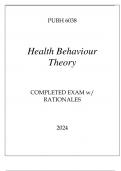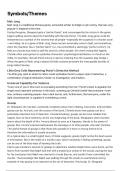Summary
Summary Edexcel Religion and Ethics A-Level - Kantian Deontology Master Document
- Course
- Institution
A summary of the Edexcel Zig-Zag guide to religion and ethics within the religious studies A-Level, organised by the specification to ensure that all areas are covered. Includes scholars' quotes and the basic knowledge of the deontology topic. Got an A in A-Level religious studies.
[Show more]












